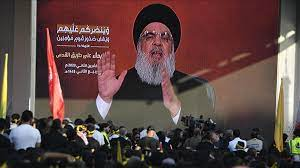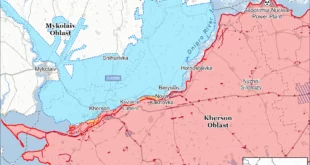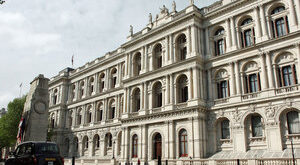It is evident that the Iranian axis is not willing to sacrifice the Syrian regime to protect the Hamas movement, according to Ibrahim Rayhan in Syria TV.
Yemen, Iraq, and Lebanon were featured prominently in Hezbollah Secretary General Hassan Nasrallah’s speech last Friday, but the Syrian regime was notably absent.
Nasrallah spoke for over an hour about the regional situation and Lebanon’s southern borders. However, what stands out is the complete absence of any mention of Syria throughout his speech.
Historically, Hezbollah has often referred to the Syrian regime as “the pillar of the axis of resistance,” showering it with praises and chants of “victories.” Nevertheless, this time was different due to the significant events unfolding in the region, which could have disastrous consequences for Iran and its allies if not handled correctly.
Several factors explain why Damascus was missing from Nasrallah’s speech and the broader landscape:
- On October 8, the President of the UAE, Mohammed bin Zayed, reached out to Syrian President Bashar al-Assad immediately after the “Al-Aqsa Flood” operation. Bin Zayed advised Assad to maintain calm along the Golan Heights and control any actions by Iranian factions on Syrian soil. A similar message was conveyed to Assad by Russian President Vladimir Putin, emphasizing that actions from the Golan Heights would come at a high cost.
- Assad publicly criticized the Hamas movement a few months ago, labelling it as hypocritical and treacherous. This stance has not changed, despite Iran and Hezbollah’s efforts to mend their relationship with the Group. The Syrian regime’s deep-seated animosity towards dissenters persists, even if reconciliation is attempted.
- Notably, there were no significant “popular movements” in areas controlled by the Syrian regime in support of the Palestinian resistance in Gaza. This suggests that the regime has actively prevented any expressions of solidarity with the Hamas movement.
- The Golan Heights is a weak point within the Iranian axis, situated just 60 kilometres from Damascus. This region has a history of military defeat, with the Israeli army nearly reaching the capital during the 1973 October War. The Syrian regime’s concessions and the intervention of the Iraqi army prevented the Israeli army from advancing further.
- Syria faces internal turmoil, including protests in Suwayda and escalating tensions in Daraa, potentially rekindling the early stages of the revolution. Economic hardships and growing wealth disparities among militia leaders, drug traffickers, and those benefiting from their connections with the regime contribute to the unrest.
- A delegation from the Iraqi Popular Mobilization Forces visited Damascus and received a firm rejection from regime officials regarding the use of Syrian territory against Israel. This prompted the Popular Mobilization Forces to shift their focus toward the Iraqi-Jordanian border.
- Both the United States and Israel issued stern warnings to Iran, Hezbollah, and the Syrian regime, cautioning against expanding the war in the region or moving the Golan front. They threatened direct Israeli action against the Syrian regime, potentially leading to its downfall and permanent closure of the Albukamal-Beirut road. Israel responded to these warnings by targeting Damascus and Aleppo airports.
In conclusion, Iran and its allies have invested significant human, financial, and economic resources to safeguard the Syrian regime since their extensive intervention in 2012. It is evident that the Iranian axis is not willing to sacrifice the Syrian regime to protect the Hamas movement.
Syria holds a pivotal role as a logistical corridor for Hezbollah, facilitating the transportation and export of weapons, ammunition, and fighters. It serves as an Iranian gateway to the Arab world, providing leverage in dealings with the United States and as a card to threaten Israel’s security.
The absence of the “Syrian regime” from the speeches of Axis leaders underscores the failure of the “resistance” narrative in the face of real-world challenges, highlighting the prioritization of the regime’s protection over that of Gaza, which found itself isolated after wrongly assuming unwavering support that ultimately served to suppress rather than assist the people.
 Eurasia Press & News
Eurasia Press & News




